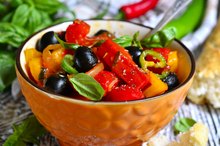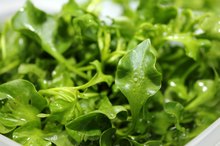Does Light Affect How Quickly Foods Spoil?
Exposure to light is one factor that can cause foods to spoil faster. Both natural and artificial light can speed this process, called photodegradation, according to the Department of Food Science and Human Nutrition at Clemson University 1. Exposure to sunlight, fluorescent and incandescent light can all cause photodegradation.
How It Works
Photodegradation occurs when the absorption of light directly causes a chemical reaction in a constituent in the food, or when light indirectly causes a reaction in a second constituent by its effect on the first one. Photodegradation usually affects specific components in food, such as pigments, vitamins, fats and proteins. Absorption of light can cause food to develop off-flavors and lose or change color. It can also cause vitamin loss.
- Photodegradation occurs when the absorption of light directly causes a chemical reaction in a constituent in the food, or when light indirectly causes a reaction in a second constituent by its effect on the first one.
- Photodegradation usually affects specific components in food, such as pigments, vitamins, fats and proteins.
Light Sensitivity
What Does Cooking Do to Vitamin C?
Learn More
Light usually penetrates only the outer layer in a solid food, typically causing discoloration on its surface. Light can penetrate liquids more deeply and affect more constituents because of mixing and agitation.
Examples of Photodegradation
When brightly-colored spices and herbs, such as:
- chili powder
- have faded
- their flavor
- nutrient content have suffered
- too
In addition, water-soluble vitamins such as those in the B family are very sensitive to photodegradation. For example, the riboflavin content in enriched macaroni has been known to drop by 50 percent after exposure to light for one day, according to MSNBC.com. In addition, antioxidant activity in olive oil can decrease by 40 percent after six months when stored in the open.
Additional Information
The Effects of Microwaving on Food
Learn More
The added effect of heat, air and moisture, as well as light, can all cause food to deteriorate faster. Storing food in a dark, cool and dry place can preserve its quality and significantly extend its shelf life. Stored properly, foods such as:
- dried fruit
- soup
- meat
- peanut butter
- coffee
- tea
- cookies
- crackers
- granola can last for years
- according to Science Daily
Packaging food in opaque containers also helps to prevent photodegradation.
Related Articles
References
Writer Bio
Lexa W. Lee is a New Orleans-based writer with more than 20 years of experience. She has contributed to "Central Nervous System News" and the "Journal of Naturopathic Medicine," as well as several online publications. Lee holds a Bachelor of Science in biology from Reed College, a naturopathic medical degree from the National College of Naturopathic Medicine and served as a postdoctoral researcher in immunology.









